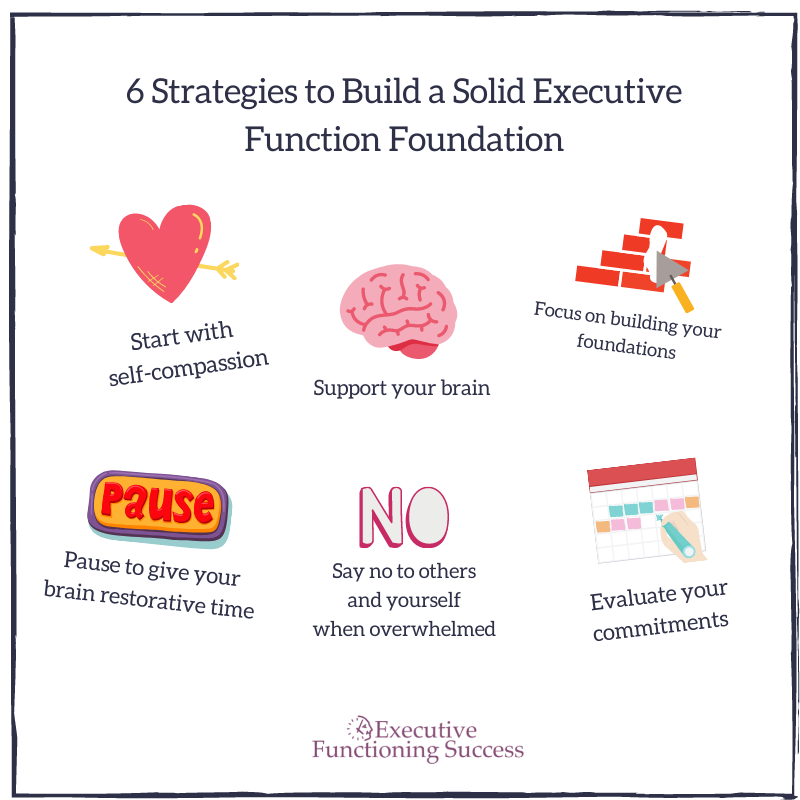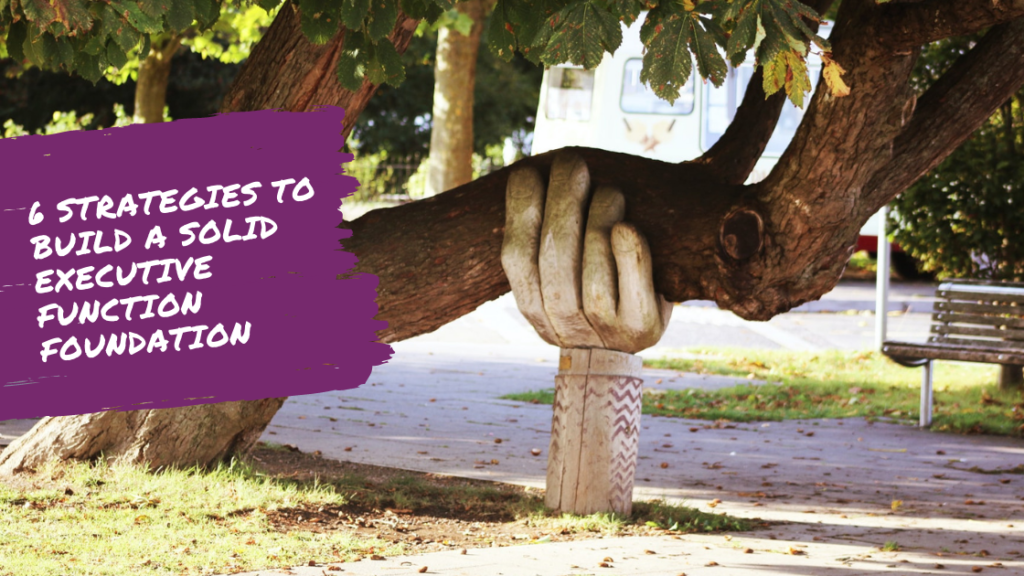As I work with clients on time management, many are overwhelmed by the demands on their lives. They feel stuck – like they are in a downward spiral. Their brains and bodies are cracking under the pressures of life in this fast-paced, distraction-oriented world.
In a nutshell, at this moment in time, the environment around them, (and their reactions to it), have created an unsustainable situation. Sadly, I don’t have the magic wand to wipe away their stress and magically rebalance their lives. If only I could!
What I can do is to help my clients strengthen their self-awareness. This means improving, little by little, their brain’s executive functioning. I do this, not by tackling the large systemic problems, but by focusing on the little tiny actions that they can do every day to improve the quality of their lives; to help them develop a more solid foundation.
Use Foundational Strategies to Build a Sustainable Life
How to do that? These are the elements that I consider to be most important for building a more balanced and sustainable life.
 Start with self-compassion. You’ve been doing the best you can. In fact, you may actually be a hero, working under external demands beyond your control. Give yourself a hug. Feel my hug. I am also thinking of those with brain differences, like Executive Functions Deficits or ADHD. You didn’t ask for those challenges. Give yourself compassion. This world was NOT designed for neurodiverse brains, and you have extra challenges to face every day. Acknowledging that is important.
Start with self-compassion. You’ve been doing the best you can. In fact, you may actually be a hero, working under external demands beyond your control. Give yourself a hug. Feel my hug. I am also thinking of those with brain differences, like Executive Functions Deficits or ADHD. You didn’t ask for those challenges. Give yourself compassion. This world was NOT designed for neurodiverse brains, and you have extra challenges to face every day. Acknowledging that is important.- Focus on building your foundation. At the beginning of my Seeing My Time course, I highlight three key foundations, which are: nutrition, exercise and sleep. If you were to rate your behaviors in those areas, zero to five, how would you do? If you do nothing else to rebalance your life, focus on raising those scores. Eat quality food on a regular basis. Get your body moving, starting with a tiny tiny goal. Take a hard look at your sleep hygiene. Are you staying up too late, trying to cram in more work or escaping into the digital world, robbing your brain of critical hours of restorative sleep? Your brain absolutely requires this foundation in order to function and improve time management.
- Pause. Yes, pause and give your brain some restorative time. I’m not talking about escaping from what you need to do. Often those activities don’t recharge us. (How do you really feel after binging on Netflix for a few hours?) I’m talking about mindful activities that recharge you. Again, start tiny if that is all you can manage. Make a list of things that bring you joy and calm you. Keep it handy so you can remember your options when you are overwhelmed.
- Say no, to others, and yourself. Don’t add more to your plate. Time does not stretch to allow for stuffing obligations or desires into your day. We can forget that often it is our own choices that add to the overwhelm. Set boundaries so that you can honor your foundational needs. We can’t do it all. Practice saying no. That is something I had to learn years ago. Here’s the script for those requests: “Thank you for asking. I don’t have room in my schedule for any more commitments.” If you struggle with saying no to yourself, here’s a script for the conversation in your mind: “Marydee (use your own name here!), you won’t have time for this.” Don’t set up future pain for immediate pleasure.
- Evaluate your commitments. This step can be the hardest, which is why you need to work on the preceding four steps. When we are in the thick of feeling overwhelmed, it is very hard to see that we actually do have choices about our commitments. At this point, you need to step away and get a fresh perspective on those options. Often we need an unbiased third party, like a counselor, to help clear away the clutter in our minds. For starters, are there commitments that you can withdraw from to rebalance your life? Make a plan to exit those commitments. I say “yes” very rarely, and only to things that align with my purpose and my values and which will bring me some joy too!
- Support your brain. Once you’ve created some space and energy in your life, it is time to use external tools to keep you on track with getting the things done that can fit into a day. Have analog clocks around you. Use whiteboards and your Seeing My Time Planner. Make sure your day plans are achievable.
I invite you to consider the importance of honoring the needs of your precious brain and body so you can have a sustainable life. You deserve and need the energy to live well and thrive as you face life’s challenges.
Little by little, the overwhelm will dissipate.
Marydee

